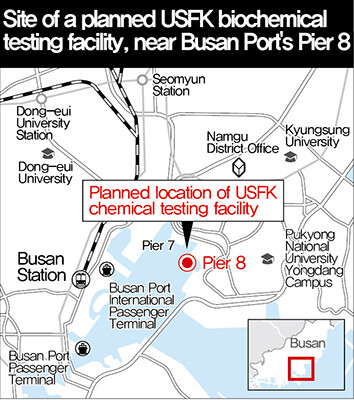hankyoreh
Links to other country sites 다른 나라 사이트 링크
Opposition lawmakers seeking ban on imports of anthrax and other deadly materials

Legislation has been submitted to the National Assembly to ban the import of anthrax bacteria and other organisms used in deadly weapons.
Park Jae-ho, a Minjoo Party of Korea lawmaker for Busan’s Nam-B district, announced on Sep. 19 that he and 43 other lawmakers had “presented two legislative amendments to the National Assembly that would ban imports of anthrax and other biological agents that are lethal to the human body, live or dead.”
The laws proposed for amendment are the Act on the Control of the Manufacture, Export and Import, etc. of Specific Chemicals and Chemical Agents for the Prohibition of Chemical and Biological Weapons (the Biological and Chemical Weapons Prohibition Act) and the Infectious Disease Control and Prevention Act.
The amendments would prohibit foreign armed forces stationed in South Korea from bringing in biological agents such as anthrax not only when live but also when killed or sterilized. Currently, live biological agents can be brought into South Korea upon approval by the Minister of Trade, Industry and Energy, while dead or sterilized inactive agents can be imported without any permission procedures. This loophole is what allowed US Forces Korea to bring dead anthrax bacteria onto its Yongsan and Osan bases for experimentation 16 times between 2009 and last year.
The amendments would also make biological agents like anthrax an exception to the terms of the Status of Forces Agreement (SOFA) between South Korea and the US. Article 9 of SOFA states that USFK’s military freight does not need to pass through customs inspection when entering South Korea.
In Apr. 2015, the Edgewood Chemical Biological Center in Maryland sent one-milliliter samples of dead anthrax and plague bacteria to USFK’s Osan base for testing. The samples were used for USFK’s JUPITR program to prepare against the threat of North Korea’s biological weapons. It eventually emerged that no customs screening had taken place in the process.
If the amendments do pass the National Assembly’s regular session, the USFK would be unable to bring anthrax or similar agents into South Korea for military purposes. As part of its JUPITR program, USFK is planning to set up biological and chemical weapon detection and warning facilities at eight piers in the port of Busan - near the city‘s downtown area - through November of this year. Busan-area civic groups are opposing the move, citing concerns about possible casualties from a leakage of anthrax or other agents.
By Kim Kwang-soo, Busan correspondent
Please direct questions or comments to [english@hani.co.kr]
Editorial・opinion
![[Column] Park Geun-hye déjà vu in Yoon Suk-yeol [Column] Park Geun-hye déjà vu in Yoon Suk-yeol](https://flexible.img.hani.co.kr/flexible/normal/500/300/imgdb/original/2024/0424/651713945113788.jpg) [Column] Park Geun-hye déjà vu in Yoon Suk-yeol
[Column] Park Geun-hye déjà vu in Yoon Suk-yeol![[Editorial] New weight of N. Korea’s nuclear threats makes dialogue all the more urgent [Editorial] New weight of N. Korea’s nuclear threats makes dialogue all the more urgent](https://flexible.img.hani.co.kr/flexible/normal/500/300/imgdb/original/2024/0424/7317139454662664.jpg) [Editorial] New weight of N. Korea’s nuclear threats makes dialogue all the more urgent
[Editorial] New weight of N. Korea’s nuclear threats makes dialogue all the more urgent- [Guest essay] The real reason Korea’s new right wants to dub Rhee a founding father
- [Column] ‘Choson’: Is it time we start referring to N. Korea in its own terms?
- [Editorial] Japan’s rewriting of history with Korea has gone too far
- [Column] The president’s questionable capacity for dialogue
- [Column] Are chaebol firms just pizza pies for families to divvy up as they please?
- [Column] Has Korea, too, crossed the Rubicon on China?
- [Correspondent’s column] In Japan’s alliance with US, echoes of its past alliances with UK
- [Editorial] Does Yoon think the Korean public is wrong?
Most viewed articles
- 1‘We must say no’: Seoul defense chief on Korean, USFK involvement in hypothetical Taiwan crisis
- 2‘Weddingflation’ breaks the bank for Korean couples-to-be
- 3[Reportage] On US campuses, student risk arrest as they call for divestment from Israel
- 4[Column] Park Geun-hye déjà vu in Yoon Suk-yeol
- 5Amnesty notes ‘erosion’ of freedom of expression in Korea in annual human rights report
- 6Korea sees more deaths than births for 52nd consecutive month in February
- 7N. Korean delegation’s trip to Iran shows how Pyongyang is leveraging ties with Moscow
- 8Will NewJeans end up collateral damage in internal feud at K-pop juggernaut Hybe?
- 9[Guest essay] The real reason Korea’s new right wants to dub Rhee a founding father
- 10N. Korean hackers breached 10 defense contractors in South for months, police say